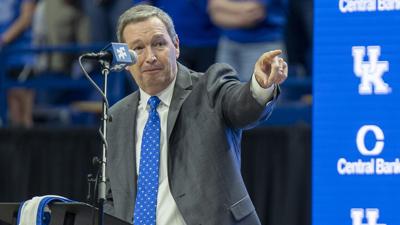LOUISVILLE, Ky. (WDRB) -- Mitch Barnhart has climbed Mount Rainier. He's summited Kilimanjaro. He's scaled the Grand Tetons.
He knows what happens when you climb too fast without acclimating. And on Friday, at Kentucky's football media day, the longtime athletics director sounded less like someone preparing for a football season than someone scouting the safest route through a storm at 18,000 feet.
College athletics, he suggested, has skipped base camp. He didn't use those words. But he painted the picture of a system moving so fast that no one's had a chance to catch their breath.
"There's going to be a clunkiness to it," Barnhart said of the NCAA's new revenue-sharing era. "We've talked about a decade's worth of change that has happened in the last six to ten months of college athletics. ... We don't even have a governance structure in place, to be honest with you."
Louisville | Kentucky | Indiana | Eric Crawford
Translation: We're halfway up Everest, and no one's in charge of the map.
In mountaineering, base camp is where climbers acclimate, plan, and prepare for the push higher. It's where they learn the weather, adjust to the altitude, and make smart decisions. Skip that, and even a good plan can collapse.
College sports is ascending fast. Revenue sharing is here. NIL is only beginning to be regulated. Roster spending is increasing but roster spots are shrinking. Barnhart said UK's athlete roster will drop from 675 to about 530. That's 145 opportunities gone.
"That breaks my heart," he said.
At the same time, Kentucky is pouring $50 million into new scholarships and athlete benefits with no new revenue to offset it. The athletics department borrowed $31 million from the university to meet expenses for the next two seasons — a rarity at UK — and much more for building projects.
"That is all new expense," Barnhart said. "No revenue attached to it."
This is why he won't commit to firm numbers. "Fluid" was his word of the day. Kentucky's $20.5 million revenue-sharing cap doesn't carry over — any unused money disappears — so the athletics department must make real-time decisions across all sports. Six programs are participating so far. Others may follow. But don't ask him for a formula.
And the cap increases four percent every year. So even if you figure out your route this year, next year you're climbing a different mountain.
Barnhart knows the climb isn't clean.
"Everyone is in the weeds," he said. "I've been in the middle of those conversations for 10 months, 12 months, and it's a lot. It is an absolute lot."
That's why he resists criticism, or the temptation to oversimplify.
"To sit here and be critical of the system that's only been in place for four weeks," he said, "really, really difficult."
Instead, he's choosing patience.
"We've got to find a way through it and just gently walk through this thing and let it smooth itself out," he said. "There's a lot of really good people working at this thing, and I'm thankful for that. We've got a lot of folks trying hard."
In mountaineering terms, he's trying to keep his program below the danger zone long enough to figure out where the trail leads. With laws differing from state to state and practices varying by conference, the landscape is anything but stable.
"We need everyone to say, 'OK, we're all going to be in the same space to start with,'" Barnhart said. "I don't think we can get to the space you're talking about if we don't have that to begin with. We're going to have to find some continuity in those conversations."
He doesn't love this new world. But he's not walking away from it.
"We're in some really choppy waters," he said. "Really choppy waters. We're trying to find our way through it. I think it's important that we try and smooth the waters for the next generations ... to help them maintain the opportunities we have."
That's why Kentucky is investing in stadium upgrades that double as revenue drivers. That's why they created a new LLC to help fund sports and chase new income streams. This isn't short-term spending. It's long-term survival.
He ended Friday with a story about a South Carolina road and a couple flying a Kentucky flag from a tree. They didn't know who he was. They just wanted to talk about the Duke game. That, Barnhart said, is what matters — not lawsuits, not settlements. Just fans hoping to see the Cats win.
But for that to keep happening — for the games to keep going — someone has to hold the rope. Someone has to chart the route. Someone has to build the base camp.
Barnhart knows what happens when you climb without one. And unlike much of college sports, he's trying to build one before it's too late.
Quick Sips
Tyran Stokes, the No. 1 recruit in the nation and a Louisville native, came home over the weekend and set local fans buzzing with a few comments. [Read them here.]
The NCAA Tournament will stay at 68 teams — for now. [Here's what's up.]
The Last Drop
"A few things we would like to acknowledge on the front end. A couple of folks that have retired from following college sports. Rick Bozich, great 50-year career from Louisville … John Clay from the Lexington Herald-Leader was inducted into the United States Basketball Writers Hall of Fame … I hope they have great retirements."
— Mitch Barnhart, opening his remarks Friday
Copyright 2025 WDRB Media. All Rights Reserved.











